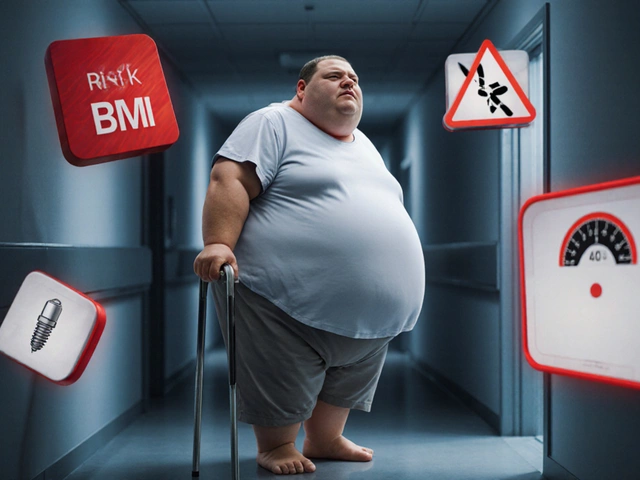Trying to drop 20 pounds fast? You’re not alone—and you’re definitely not crazy for wanting results now, not months from now. Most people get sucked into crash diets, juice cleanses, or weird TikTok hacks. Spoiler: those almost never work long term.
The first thing you need to know? Losing twenty pounds quickly is possible, but you’ve got to be smart about it. Skip the starvation routines. Your body isn’t a math equation—eat less, lose more doesn’t always pan out like you’d hope. Your body will fight you if you go too hard, too fast.
Weight loss clinics are seeing a record wave of visitors in 2025. Why? Because people have realized that ‘DIY dieting’ often leads to burnout and disappointment. Clinics have access to the latest tools, expert coaches, and, yeah, actual doctors who keep an eye on your health while you drop pounds. No gimmicks, no voodoo potions.
If you want real, fast results, you have to work with your body, not against it. Think about swapping out processed foods for protein-rich meals, dialing up your water intake, and actually getting some sleep for once. It’s not magic, it’s common sense done right, and it’s what clinics get paid to guide you through.
- Why Most Quick-Fix Diets Fail
- What Really Works According to Clinics
- The Power of a Personalized Plan
- Spotting Red Flags in the Fast Lane
- Keeping the Weight Off for Good
Why Most Quick-Fix Diets Fail
Ever notice how people seem to lose weight super fast with a new diet, but a few months later they’re usually right back where they started—or worse? There’s a reason those "drop 20 pounds in 2 weeks" plans rarely stick. Quick-fix diets mess with your head, your body, and mess you up for the long haul.
Most severe diets slash calories so low that your body freaks out. Within a few days, your metabolism slows down to save energy. That means you actually burn fewer calories and end up feeling tired, cranky, and obsessed with food. No wonder people quit.
Here's the kicker: a big chunk of that "fast weight loss" isn't real fat loss. You’re mostly dropping water weight and muscle, not actual fat. Once you stop, the scale bounces back (and sometimes adds even more). So, while every lose weight fast promise sounds amazing, it rarely works out for good.
| Quick-Fix Diet Claim | What Really Happens |
|---|---|
| Lose 10 lbs in a week | Mostly water, some muscle, not sustainable fat loss |
| No carbs, only shakes | Short-term drop on scale, then cravings and rebound |
| Extreme calorie cuts | Slower metabolism, low energy, increased hunger |
Another reason these diets bomb? They don’t teach you anything about actual nutrition or how to keep weight off. It’s just short-term suffering, not long-term living. And if you mess up for a single day, guilt kicks in and you want to give up. It’s a cycle.
Want to drop 20 pounds for real? Skip the shortcuts. You'll save yourself a ton of stress—not to mention time wasted on diets that never last.
What Really Works According to Clinics
So, what are weight loss clinics actually doing to help people lose weight fast? Turns out, their secrets aren’t that mysterious, but they cut through the noise and focus on strategies that really pay off. Clinics start by running safe, in-depth health checks—blood tests, blood pressure, and body composition scans. They’re not handing out generic plans because what works for one person might totally flop for someone else.
The core routine in most clinics combines three things: portion-controlled eating, a bump in protein, and medically supervised activity.
- Custom meal plans: Forget one-size-fits-all diets. Clinics build your food plan around your body type, starting stats, and health risks. They hone in on high-protein, low-carb meals to keep you full and push your body to burn fat fast, not muscle.
- Professional guidance: With nutritionists and sometimes doctors on the team, you get real feedback. If something isn’t working, the plan changes. Weekly check-ins track your progress, so you can adjust and avoid plateaus.
- Medically approved boosts: Some clinics offer prescription-based tools, like appetite suppressants or weight loss injections (think semaglutide, very 2025). Used for a short period and under supervision, these can give a head start, especially for folks stuck after trying everything else.
- Real accountability: When you know you’ll see your coach or nurse next week, skipping a workout or raiding the fridge feels a lot less tempting. This accountability pushes most folks to follow through when solo efforts fall short.
You might hear "just eat less and move more," but clinics make those steps specific and doable. For example, the average plan at a top clinic gets people aiming for 1,200–1,500 calories a day, with at least 70–100 grams of protein to keep the metabolism from tanking. Daily step targets and short, doable workouts come built-in.
| Clinic Program Element | Why It Works |
|---|---|
| High-Protein, Low-Carb Meals | Keeps you full, helps burn fat not muscle |
| Weekly Check-ins | Tracks progress, allows fast tweaks |
| Fitness Guidance | Short circuits, steps, or gentle movement—no need to kill yourself in the gym |
| Medical Supervision | Makes sure fast weight loss stays safe |
If you walk into a clinic and they promise 20 pounds in a week or push only pills, walk out. Real experts are realistic. According to the National Weight Control Registry, most patients who stick with a clinic’s plan can safely lose about 2–4 pounds per week—so you’re aiming for that 20-pound goal in about two months, with your health intact.

The Power of a Personalized Plan
If you’re serious about shedding pounds fast, don’t follow some generic meal plan you found on a random website. What works for your buddy or your coworker might not work for you at all. That’s where a personalized plan from a weight loss clinic comes in. They figure out what your body actually needs—and what it doesn’t.
Here’s why personalized plans make a real difference:
- Metabolism isn’t one-size-fits-all. Some folks can eat carbs all day and drop weight, while others just look at a donut and gain two pounds. Clinics often start with blood tests and health screenings to see what’s going on under the hood.
- Food sensitivities and allergies matter. Some people bloat up or feel sluggish after certain foods, which can slow weight loss big time. A clinic can pinpoint trigger foods and swap them out for stuff your body handles better, boosting your chances to lose weight fast.
- Medically-supervised plans can use real data. Tracking your progress with legit tools (like body scans or metabolism tests) keeps you from guessing. It also means you can spot plateaus early and tweak your plan, instead of stressing out when the scale won’t budge.
| Factor | DIY Diet | Clinic-Guided Plan |
|---|---|---|
| Calorie Targets | Based on guesswork | Customized by doctors |
| Meal Choices | Random, generic suggestions | Tailored to your needs |
| Progress Tracking | Home scale (lots of errors) | Professional assessments |
One more reason to go personalized—a lot of folks give up when plain old calorie-cutting stops working. A real clinic team can spot why and switch things up, sometimes with supervised medication or injection programs if you’re a good candidate. That kind of support is hard to beat.
If you want to drop 20 pounds and keep it off, do yourself a favor: skip the cookie-cutter diets and get a plan that’s actually built for you.
Spotting Red Flags in the Fast Lane
Fast weight loss clinic plans sound great online, but some are more smoke and mirrors than science. There are real risks if you jump on anything that promises to help you lose weight fast without real effort or a proper plan. Let’s break down some classic red flags so you don’t waste your time, money, or health.
- Extreme Calorie Slashing: If a program tells you to eat less than 800 calories a day, run. That’s what hospitals use for extreme obesity and always under medical watch. At home? It usually ends in binge eating, muscle loss, or worse.
- Secret Ingredients: Watch for any product that’s cagey about what’s inside. You should know exactly what you’re swallowing or drinking. Random “fat burner” pills have landed people in the ER—these aren’t monitored like real medications.
- No Medical Oversight: Real weight loss clinics have licensed pros. Anyone offering to help you drop 20 pounds fast but avoids doctors or blood work isn’t safe to trust.
- Guaranteed Results: If someone promises that “everyone loses 20 pounds in two weeks,” that’s bogus. Everyone’s biology is different, and progress varies. Nothing is truly guaranteed except disappointment if you buy the hype.
- Zero Personalization: Cookie-cutter plans ignore things like medication, hormones, and underlying medical issues. Be wary if you answer a quick quiz and get a “perfect plan” in seconds.
Ever seen before-and-after pictures that look too good to be true? A lot are staged or edited. The FTC reported over 20,000 complaints in 2023 about online weight loss scams alone. That tells you how common fake “success stories” still are.
| Red Flag | Why It Matters |
|---|---|
| No medical check-ups | Misses health conditions that need doctor’s care |
| Unlabeled supplements | You have no idea what you’re putting in your body |
| One-size-fits-all meal plans | Ignores personal needs, smaller chance of long-term success |
Bottom line: Real clinics use safe, evidence-based methods and always check your health first. If something looks shady or makes wild claims, it’s your cue to find a smarter, safer option. Don’t gamble with your health for the sake of fast results.

Keeping the Weight Off for Good
It’s one thing to lose weight fast—but it’s a whole other beast to make sure those pounds don’t sneak right back. Fact: over 80% of people who drop a significant amount of weight will regain it within a year unless they change up their habits for good. So what separates the folks who keep it off from those stuck in yo-yo mode? It’s consistency, not perfection.
Let’s talk real strategies that keep you slim long after the first 20 pounds are gone:
- Track what you eat, but don’t get obsessed. Apps make it easy. Even snapping a photo before you eat helps keep things on your radar.
- Keep moving, but don’t stress over marathons. A 2022 study found that 150 minutes of moderate walking a week helps maintain healthy fat loss better than brief periods of intense exercise followed by nothing.
- Don’t fall into the all-or-nothing trap. Friday night pizza doesn’t ruin your progress; just get back on track the next day.
- Build a daily routine—same breakfast, set gym times, whatever works for you. Those little habits add up.
- Stay connected. Folks checking in with a coach or a buddy from their weight loss clinic have way better odds of keeping weight off.
Want a quick breakdown? Here’s what a typical week might look like for people who hang onto their results:
| Habit | Frequency/Target |
|---|---|
| Meal prep/planning | Sunday, plus quick checks midweek |
| Weigh-ins | 2–3 times per week (no daily obsession) |
| Physical activity | 30 minutes, 5x per week |
| Sleep | 7–8 hours each night |
Bottom line: there’s no magic finish line. Make these things regular—not one-time fixes—and you’ll notice that quick weight loss sticks. If you ever start slipping, just review what worked, tweak your routine, and get right back at it.

 Who Is a Bad Candidate for Knee Replacement? Key Red Flags to Know
Who Is a Bad Candidate for Knee Replacement? Key Red Flags to Know
 Can Christians Take Herbs? A Practical Guide to Herbal Supplements and Faith
Can Christians Take Herbs? A Practical Guide to Herbal Supplements and Faith
 Dental Implants: What Are the Downsides You Need to Know?
Dental Implants: What Are the Downsides You Need to Know?
 Can Ashwagandha Cause Weight Gain? What You Really Need to Know
Can Ashwagandha Cause Weight Gain? What You Really Need to Know
 What Herbs Should You Not Mix Together? Avoiding Dangerous Herbal Combos
What Herbs Should You Not Mix Together? Avoiding Dangerous Herbal Combos